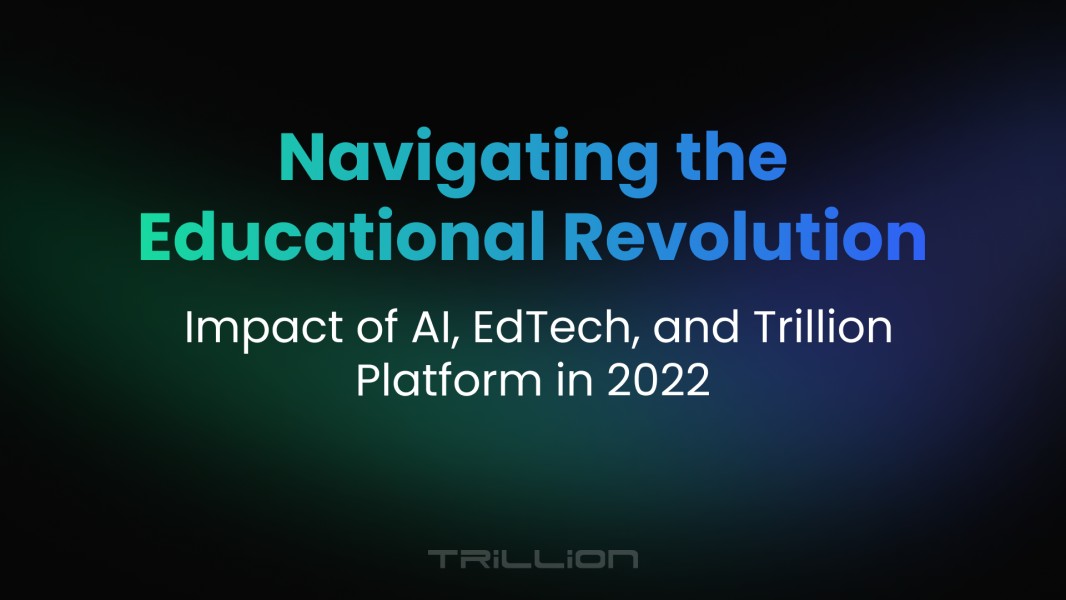
The year 2022 marked the launching pad for the development of AI technologies, quickly permeating all aspects of life, including the field of education. Today, we delve into the material on how AI will impact the EdTech sector.
It's important to note that Trillion Platform stands as both a developer and ambassador of an EdTech platform with a focus on advancing the UN Sustainable Development Goals (SDGs). Notably, the platform has undertaken the responsibility for the development of goals 3, 4, and 8. In the ever-evolving landscape of education technology, the integration of AI is set to play a transformative role, and Trillion Platform, with its commitment to the SDGs, positions itself at the forefront of this technological revolution.
The landscape of education is undergoing a remarkable metamorphosis, primarily propelled by two influential forces: Artificial Intelligence (AI) and Educational Technology (EdTech). These dynamic advancements are reshaping the methodologies of learning, teaching, and interaction with educational content. This article will explore the exciting ways in which AI and EdTech are revolutionizing education, enabling both students and educators to achieve unprecedented heights.
The Ascendance of AI in Education Artificial Intelligence, once confined to the realms of science fiction novels and movies, has become an integral component of the contemporary educational scene. AI's capacity to process vast datasets and adapt to individual learning needs has unlocked a myriad of possibilities in education.
Personalized Learning: AI-driven algorithms meticulously analyze students' strengths, weaknesses, and learning styles, paving the way for personalized educational experiences. Adaptive learning platforms, exemplified by Duolingo and Khan Academy, deliver tailored content to assist students in mastering specific concepts. Intelligent Tutoring Systems: AI tutors provide real-time assistance, addressing queries and offering explanations precisely when students require them. These systems ensure immediate feedback, minimizing frustration and amplifying comprehension. Predictive Analytics: Educational institutions leverage AI to identify at-risk students, enabling timely interventions. By scrutinizing performance data, educators can furnish additional support and resources to those in need. Gamification: AI-infused gamified learning platforms inject an element of engagement and enjoyment into education. Students can undertake quests, earn rewards, and advance through levels while mastering educational content.
The Role of EdTech, a comprehensive term encompassing digital tools and resources designed to augment education, stands as an indispensable partner in the educational revolution. It empowers educators, students, and parents with innovative solutions that facilitate learning.
Online Learning Platforms: Learning Management Systems (LMS) like Trillion EdTech Platform, granting students access to course materials, assignment submissions, and online discussions. Virtual Reality (VR) and Augmented Reality (AR): VR and AR technologies transport students to immersive educational environments, enriching understanding and retention. For example, medical students can practice surgeries in virtual operating rooms. Interactive E-books: Multimedia-enriched e-books incorporate elements such as videos, simulations, and quizzes, enhancing the engagement and interactivity of learning. Collaborative Tools: Platforms like Google Workspace for Education promote collaboration among students and educators, nurturing teamwork and communication skills.
Pros and Cons of AI and EdTech Integration in Education
The incorporation of AI and EdTech into education brings forth a multitude of benefits:
-
Accessibility: Online learning breaks down geographical barriers, providing access to education for individuals of all ages and backgrounds.
-
Engagement: Interactive and gamified learning experiences captivate students' attention, fostering a genuine love for learning.
-
Efficiency: AI-driven assessments and analytics save educators time, pinpointing areas where students may require additional support.
-
Customization: Tailored learning paths accommodate individual needs, ensuring no student is left behind in their educational journey.
However, there are notable challenges to navigate:
-
Equity: Bridging the digital divide to ensure all students have access to requisite technology and resources remains a significant challenge.
-
Data Privacy: Given the extensive information collected by AI and EdTech platforms, safeguarding student data and ensuring privacy is of paramount importance.
-
Teacher Training: Effective integration of these technologies into classrooms necessitates ongoing training and support for educators.
In conclusion, the future of education shines brightly, courtesy of the transformative influence of AI and EdTech. These innovations are reshaping the learning and teaching landscape, enhancing accessibility, engagement, and effectiveness in education. Moving forward, it is imperative to tackle the challenges at hand, ensuring that every student can reap the benefits of this educational evolution. With AI and EdTech as our allies, the potential for education is limitless, promising a brighter future for learners across all age groups.